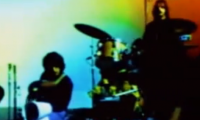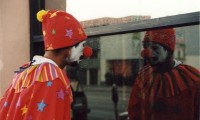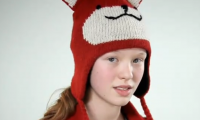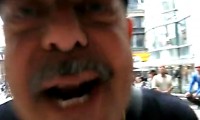Michael Jackson, “They Don’t Care About Us” First Version (1995)
“Skinhead, dead head
Everybody gone bad
Situation, aggravation
Everybody allegation
In the suite, on the news
Everybody dog food
Bang bang, shot dead
Everybody’s gone mad
All I wanna say is that
They don’t really care about us.”
So sings Michael Jackson in his song “They Don’t Really Care About Us.” In the video he’s dancing furiously, wearing a T-shirt with a peace symbol on it. He’s on the streets of Rio de Janeiro, chanting the angry lyrics. He is surrounded by hundreds of members of Afro Brazilian Olodum group. The video was directed by Spike Lee.
The song is a protest but against what and whom? The lyrics, written by Jackson are unclear: Who’s “everybody”? Who is the “they”? Who is the “us”?
“Beat me, hate me
You can never break me
Will me, thrill me
You can never kill me
Jew me, sue me
Everybody do me
Kick me, kike me
Don’t you black or white me.”
Jackson sings on, landing himself in some serious trouble for the language of this particular verse after the song is released. Jackson had to re-record the allegedly anti-Semitic lyrics. He also re-recorded the video where he bleeped out the offensive words.
The second video depicts what looks like beginnings of a prison riot; it is intertwined with actual, and often familiar, footage of rioting, war, genocide, starvation, assassinations, executions, beatings and other crimes against humanity. The video was banned in some countries due to its violence and was shown on MTV only at night.
Michael Jackson, “They Don’t Care About Us (Official Prison Version)” (1995)
“Tell me what has become of my rights
Am I invisible because you ignore me?
Your proclamation promised me free liberty, now
I’m tired of bein’ the victim of shame
They’re throwing me in a class with a bad name
I can’t believe this is the land from which I came
You know I do really hate to say it
The government don’t wanna see
But if Roosevelt was livin’
He wouldn’t let this be, no, no.”
The first allegations of sexual abuse happened in 1993. Were the song and video a response to it? If yes, is the song an attempt to clear his own name while simultaneously talking about the suffering of “us”? And about our struggles against the evil “them”? The system that curbs our freedoms?
In a statement Jackson said the song was about “the pain of prejudice and hate and is a way to draw attention to social and political problems.” He also said: “I am the voice of the accused and the attacked. I am the voice of everyone. I am the skinhead, I am the Jew, I am the black man, I am the white man. I am not the one who was attacking. It is about the injustices to young people and how the system can wrongfully accuse them.”
In another famous protest song,“Give Peace a Chance,” John Lennon too encountered some difficulties over lyrics. Because he couldn’t remember the original final verse of the song — “Everybody’s talkin’ ’bout John and Yoko, Timmy Leary, Rosemary, Tommy Smothers, Bobby Dylan, Tommy Cooper, Derek Taylor, Norman Mailer, Allen Ginsberg, Hare Krishna” — he just made it up when performing it for the album “Live Peace in Toronto 1969.” The verse became: “Everybody’s talkin’ ’bout John and Yoko, Eric Clapton, Klaus Voormann, Penny Lane, Roosevelt, Nixon, Tommy Jones and Tommy Cooper, and somebody.”
Also, like Jackson, he had changed words to avoid further controversy: He replaced the word “masturbation” with “mastication.”
Plastic Ono Band, “Give Peace a Chance” (1969)
Although with far more nonsensical lyrics, the message of Plastic Ono Band’s “Give Peace a Chance” is much more focused. Like Jackson’s “They Don’t Care,” Lennon’s song is a call to humanity to demand social change (and, of course, to give peace a chance). But unlike “They Don’t Care,” the call is not self-centered, bitter, resigned, and also not angry, despite the fact that the enemy is more clearly defined and definable.
Whereas Lennon’s simple lyrics never seem to take war personally, Jackson’s song sounds like whining about personal misfortune rather than for the general misfortunes of society. Unlike the paranoid “They Don’t Care,” “Give Peace a Chance” describes an enemy that is not lurking everywhere; the enemy is the Vietnam War and Lennon’s message is simply that everyone “come together.”
In this famous “bed-in” video, Lennon is surrounded by friends. We mainly see footage of anti-war protests around the United States.
About the song Lennon said: “That’s what my job, our job is, to write for the people now.”
– Jowita Bydlowska













